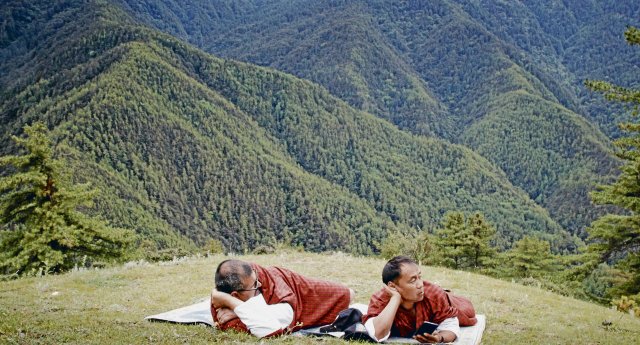Two traveling auditors of happiness
Photo: film world rental
Happiness is the fulfilled moment, the balance between inside and outside. A fleeting moment mostly only the harmony of the individual with the world. A rare moment of increased positive self -perception. So it is better not to chase after happiness, because it already knows how to avoid trying to hold it with a determined grip.
Should you give happiness in such a decisive place in life? Happiness is already if you don’t have an accident, you still live on – somehow -. Or should you translate happiness with satisfaction? But satisfied people are also unbearable again, if only because it is not far from satisfaction to self -righteousness. So, forget happiness and do what to do? In any case, this seems to me to avoid a better approach that you finally get dissatisfied with yourself. If you only sit there and wait for luck, you will definitely miss it.
So it seems interesting that in Bhutan, in the Himalaya between India and Tibet, which was completely cut off from the world until the 90s (when the last country had no television reception), the luck of the politics of the royal family is. State -prescribed happiness? That sounds suspiciously like an ideology that cannot be escaped. But in Bhutan you mean it seriously, contradicts the gross domestic product of the “gross national happiness” – and to determine it, dozens of orders are sent every year to ask people about their life situation in the most remote areas. The nationwide happiness index is then determined from the answers.
It almost sounds like sect, but Buddhism is traditionally open to such research. Already in a nationwide code of rights in Bhutan from 1629 it says: “If the government cannot create happiness for its people, then there is no reason for the existence of the government.” Sounds drastically-and in this sense the directing duo Arun Bhattarai and Dorottya Zurbó accompanies two traveling auditors with their small car and their questionnaires. We see small villages, monasteries and mountains, a picture book landscape.
Since people openly tell about their lives, which – as was to be expected – is quite difficult and not always only joyful, in the following 90 minutes we learn a lot about the life in this region of the Himalaya, where on the one hand you are open to modern life and on the other hand the tradition is up.
Hardly a million inhabitants live in an area that is about the size of Switzerland. But there is also a Nepalese minority in Bhutan, which does not have civic rights, does not get a passport and also no fixed employment. This is a serious lucky brake in the constitutional monarchy of Bhutan.
Where else is that, a state in the 21st century that puts the happiness of its citizens in the center of politics?
Amber, one of the “lucky agents” who pull from door to the door, is the main actor of this film – the first from the Nepalese minority to take up a position in a film from Bhutan. He lives alone with his mother in need of care and hopes to be able to marry – but without getting Bhutan’s citizenship, he has no chance.
This gives this remarkable road movie in search of happiness a melancholic undertone that is beneficial, because it shows that there is also a right to sadness here. We meet many people at all who are struggling to overcome their grief. There is Tshering, whose wife died and the – in Buddhist tradition – is waiting for it to be born again. Now he is holding a baby in his arms, his grandson, and is happy because he is convinced that his wife was born again.
We even encounter a transgender performer in an amusement district. Dechen feels strange in his body, dreams of being a beautiful young girl. His mother is cancer and his only support. “No matter what you are, you are a good person and nice anyway,” that’s what his mother’s life, who will soon leave him, tells him. And Amber, the lucky agent, also works his questionnaire here: does he have a donkey, a tractor, sheep or chickens? No, none of it, but he has a cell phone and a television.
A young girl is also interviewed who looks after his alcoholic mother. At least there was a happy day, says the day when the mother did not drink. This is how it goes on, which is dangerously trained in permanent happiness, we do not see anywhere here, only people between duties and longings who always have to wait. The film finds those lines that testify to a life in the Himalayas that is as difficult as it is beautiful. Biographies between the will to self -determination and adaptation constraints, like everywhere, but here in a special way. One asks in astonishment in the camera: “Why was something as sad as I was born in such a happy country?”
Nd.Diewoche – Our weekly newsletter

With our weekly newsletter . We’re Doing Look at the most important topics of the week and read them Highlights our Saturday edition on Friday. Get the free subscription here.
After all, since luck was made the central topic of Bhutan, all the subjects of the enlightened king are now wondering whether they are really happy. As I feel, this is not a minor matter here, everyone is doing something. That is why a real lucky discourse was created in Bhutan. You debate about what is still missing to a happy existence. I should be happy, strangely, I am not or very rarely! This is how you start philosophizing about your own existence.
Where else is that, a state in the 21st century that puts the happiness of its citizens in the center of politics? And if you look at the “four pillars of the gross national happiness” from Bhutan, then one regretted that this is not a relevant topic for the government: 1. Promotion of socially just social and economic development, 2nd preservation of cultural values, 3rd protection of the environment, 4. Gute government and administrative structures. That sounds like the program of a socialist party that you would like to choose.
After the latest survey, the Bhutan’s lucky index has officially increased from 90 to 93, which is traded as good news. Regardless of whether this is true or not: that the people in Bhutan should (and want to) take the topic of their individual happiness so seriously is actually good news.
»Agent of happiness«, Bhutan 2024. Regie: Arun Bhattarai, Dorottya Zurbó. 94 min. Kinostart: 3. Juli.
